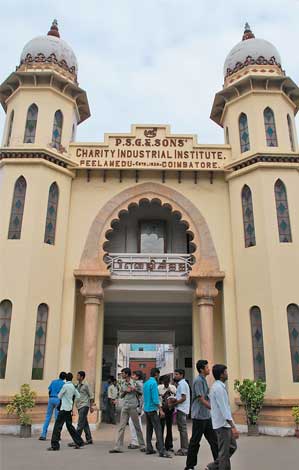 | « Back to article | Print this article |
B-school review: PSG Institute of Management
Earlier this month Careers360 issued the top 50 B-school rankings in the country. The magazine also reviewed 25 institutes, along with vital information students should be aware of when choosing their B-school.
Here we feature PSG Institute of Management, Coimbatore and its courses.
There's justifiable pride in Dr R Nandagopal, director, PSG Institute of Management as he greets me with these words, "We will probably be the first in the country to gain The Association to Advance Collegiate Schools of Business (AACSB) accreditation."
This probably explains the process-rich pedagogy of the school. Each course is structured session-wise and content-wise, though the reading lists (books, articles, etc) could do with some updation in some cases. By using Moodle
(www.immoodle.psgtech.edu), an open-source course management system, PSG has succeeded in automating a sizable section of the programme delivery and management, thus enabling an easier, richer learning experience for
the student.
Thanks to the AACSB interface, quite a bit of thought has gone into the curriculum design and delivery process. A complete curriculum revision was undertaken two years ago, and since then the number of courses has been brought down, and well-defined programme objectives and individual course objectives have been designed.
However, with the faculty teaching for over nine hours a week, an objective evaluation of how effectively these goals are monitored still needs to be examined further. And many courses still have not moved beyond the lecture mode.
Other reviews:
- Institute of Management, Nirma University, Ahmedabad
- Delhi School of Professional Studies and Research, New Delhi
- Narsee Monjee Institute of Management Studies, Mumbai
- Symbiosis Institute of Management Studies, Pune
- Mudra Institute of Communications, Ahmedabad
- Amrita School of Business, Coimbatore
- Amity Business School, Noida
- Acharya Institute of Management and Sciences, Bangalore
The courses and faculty
Student evaluation takes place online, substantially, and is based on four rubrics: written assignments, oral presentation,
class participation and mini projects. Each course has at least three of the four such components, and Moodle provides the logistics. Hence monitoring is easier and student performance could be gauged on a continuous basis. But only a few of the faculty use the software effectively, and most just transfer the paper contents on to the web.
Students mostly hail from the southern states as 50 per cent of them qualify with TANCET scores. PSG is the preferred choice for students from Tamil Nadu, and as Praveen, a second-year student says, "If Anna University becomes part of general counselling, PSG might even topple it." Thus reservation of seats for local students coupled with the institute's location, tends to make the student population slightly less diverse.
A unique feature of the school is the outbound activity centre at Anaikatti, wherein each student undergoes team-building exercises for the first three trimesters. Delivered by trained faculty members, they compensate for the lack of a residential learning experience to some extent.
Just like TISS, PSG offers an internship programme, which is totally restricted to companies within the group, and it is unpaid. Placements season is fairly long, and according to students, companies come in for region-specific placements. A large pool of alumni does seem to help, but students want the institute to organise the alumni interface much better. In general, PSG is a local thought-leader on management education, clearly visible by the number of faculty development and institution-building activities they undertake.
But one area where they appear quite weak is the industry interface as well as consulting and MDPs. The lack of industry-experienced veterans in the faculty does appear to have a role in it.
So, PSG has its task cut out for it: focus on the industry interface, bring in more practising managers into its teaching faculty, raise its MDP profile, and attempt to move out of the TANCET entry requirement.

